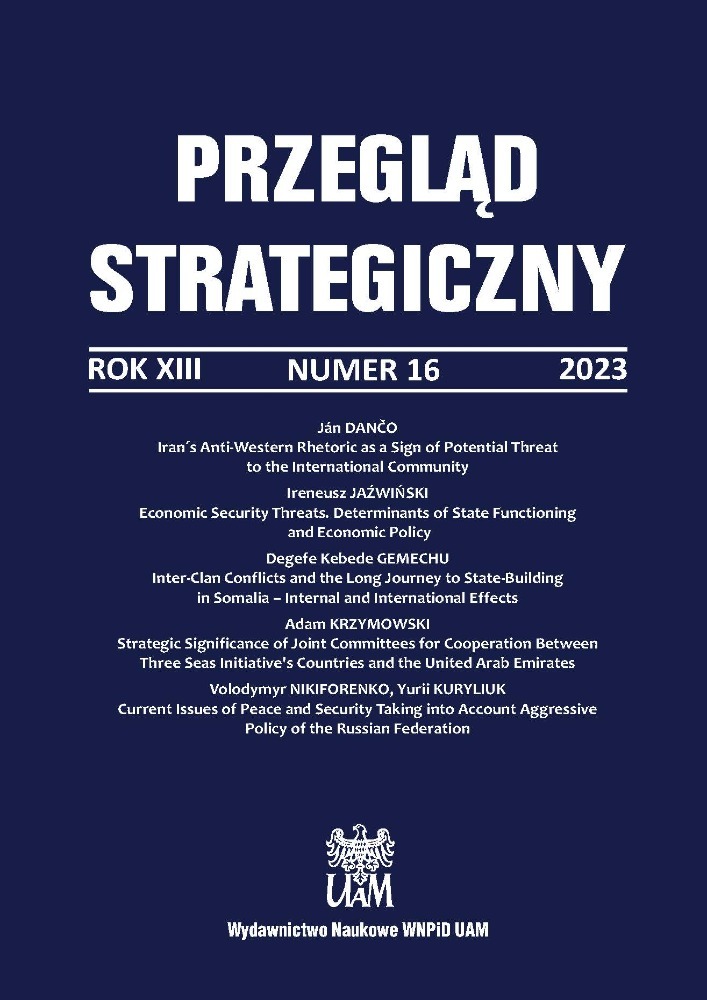Abstrakt
Przemiany zachodzące w Europie Środkowo-Wschodniej, które miały początek w 1989 r., obejmowały przede wszystkim politykę wewnętrzną i zagraniczną czterech państw, które two-rzą Grupę Wyszehradzką, tj. Czechy, Polskę, Słowację i Węgry. Przeobrażenia dotyczyły także relacji z nowo powstałymi państwami po rozpadzie Związku Socjalistycznych Republik Ra-dzieckich (ZSRR) oraz przebiegu integracji europejskiej i euroatlantyckiej. Celem artykułu jest wskazanie roli Grupy Wyszehradzkiej w systemie bezpieczeństwa europejskiego, szczególnie w obliczu wojny w Ukrainie czy też kryzysu migracyjnego. Ważkim elementem funkcjonowa-nia tejże organizacji o charakterze regionalnym jest jej współpraca z UE czy z innymi organiza-cjami. Hipoteza badawcza brzmi następująco: przyszłość Grupy Wyszehradzkiej ma sens oraz przynosi swoim członkom więcej korzyści niż strat. W artykule zastosowano metodę analizy. Kluczowym zagadnieniem, które wymaga udzielenia odpowiedzi, będzie perspektywa dalszej działalności Grupy Wyszehradzkiej w obliczu nowych zagrożeń. Czy państwa członkowskie Grupy Wyszehradzkiej sprostają wyzwaniom XXI wieku? Czy odegrają istotną rolę w kształto-waniu bezpieczeństwa europejskiego?
Bibliografia
Agh A. (2014), The fall of the Berlin Wall and European politics: Perspectives of new Europe in the early twenty-first century, in: Routledge Handbook of European Politics, (eds.) J. Magone, London–New York.
Błaziak P., The discussion “Central and Eastern Europe – can it speak with one voice?” with the participation of the prime ministers of the Visegrad Group of Ukraine, http://www.forum-ekonomiczne.pl/xxvi-forum-ekonomiczne/dyskusja-%e2%80%9eeuropa-srodkowa-i-wschodnia-czy-mozemowic-jednym-glosem-z-udzialem-premierow-grupy-wyszehradzkiej-i-ukrainy (21.05.2021).
Błażejewska P. (2016), Difficult beginnings of Visegrad cooperation in the era of political transformation, “New Eastern Policy”, No. 1.
Borkowski R. (2015), The decomposition of the Visegrad Group as an effect of the Polish policy towards the Ukrainian conflict, in: The implications of the Ukrainian conflict for Poland’s foreign and security policy. Political, military, economic and social aspects, (eds.) K. Czornik, M. Lakomy, M. Stolarczyk, Katowice.
Buczma L. (1991), Czecho-Słowacja wobec “trójkąta”, Warszawa–Praga–Budapeszt, “Sprawy Międzynarodowe”, 11: 42.
Crisis on the border with Belarus. The Visegrad Group countries are appealing to the European Union, https://www.tvn24.pl (23.11.2021).
Czarkowska E. (2007), Soviet Union intervention in Hungary in 1956, Toruń.
Czubiński A. (2008), Europe of the twentieth century, Poznań.
Czyż A., Kubas S. (2014), The Visegrad Group countries: between the past and the present. Selected aspects of domestic and foreign policy, Katowice
Deszczyński P., Szczepaniak M. (1995), Visegrad Group, Toruń.
Gawron D. (2017), Visegrad Group. Implications for unity and security within the European Union, “Krakow International Studies”, No. 2.
Gizicki W. (2013), On the legitimacy of the existence of the Visegrad Group, “Yearbook of the Institute of Central and Eastern Europe”, No. 1.
Gizicki W. (2017), Multi-level character of international relations in Central Europe, in: Multilevel international relations. Selected issues, (ed.) W. Gizicki, Lublin.
Gołembski F. (1994), Visegrad Group – an attempt to implement the concept of multilateral cooperation in Central Europe, “International Affairs”, No. 3.
Góralczyk B. (1999), Visegrad cooperation. Genesis, experiences, perspectives, Warszawa.
Grajewski A. (1996), The Visegrad Group – birth and twilight, “Political Review”, No. 32.
Grajewski A. (1991), Poland’s participation in regional groupings, “Yearbook of Polish Foreign Policy”, No. 88.
Jankowski D. (2013), Towards effective minilateralism in the field of security policy: on the example of Poland’s activity in the Visegrad Group, “National Security”, No. 27.
Kaliningrad (2023), https://www.gov.pl/web/rozwoj-technologia/zmiana-nazwy-krolewiec-zamiast-kaliningrad2 (22.05.2023).
Kochnowski R. (2015), Genesis of the break-up of Czechoslovakia, “Studia Politicae Universitatis Silesiensis”, No. 1.
Kraje Grupy Wyszehradzkiej apelują do Unii Europejskiej ws. kryzysu migracyjnego, http://tvn24.pl (23.11.2021).
Kubin T. (2014), Visegrad Group – prospects for further cooperation, “Athenaeum. Polish Political Science Studies”, Vol. 42.
Lewkowicz Ł., Czarnecki Sz., Hejj D. (2022), (Dis)unity of Visegrad Group countries in the face of Russian aggression against Ukraine, Komentarze IEŚ 567 (79/2022), https://ies.lublin.pl/komentarze/niejednosc-panstw-grupy-wyszehradzkiej-wobec-agresji-rosyjskiej-na-ukraine/ (22.03.2023).
Libicki M. C. (2016), The Future of Information Security, Institute for National Strategic Studies, http://fas.org/irp/threat/cyber/docs/infose.htm (22.04.2023).
Lorenz W. (2013), EU Battlegroup – a chance for a breakthrough in the cooperation of the Visegrad Group, “PISM Bulletin”, No. 38.
Malendowski W. (1998), Military cooperation Polish with the Visegrad Group countries, “Western Review”, No. 2.
Marcinkowski Cz. (2011), Armed Forces of the Visegrad Group countries in subregional formations for peacekeeping operations, in: Quality in the internal security efforts of the Visegrad countries from a European perspective, (eds.) P. Majer, M. Sitko, Józefów.
Panek J. (2014), The Czech Republic and Poland on the threshold of modern times, Toruń.
Pawlikowska I. (2006), Security concepts of Central European countries after 1989, Toruń.
Ruszyła budowa zapory elektronicznej na granicy polsko-rosyjskiej, http://www.gov.pl/mswia (18.04.2023).
Skolimowska A. (2015), The European Union in search of a place on the international arena, in: Crises in the process of European integration and ways to overcome them, (eds.) K. A. Wojtaszczyk, J. Nadolska, Warszawa.
Stankiewicz W. (2003), Determinants of political transformation in the countries of Central and Eastern Europe, in: Main problems of globalization, European integration and political transformation of Central and Eastern Europe, (eds.) R. Bäcker, J. Marszałek-Kawa, J. Modrzyńska, Toruń.
Szczepaniak M. (2002), Revival of the Visegrad Group (1997–2001), “Western Review”, No. 1.
The Visegrad Group in the face of Russian aggression against Ukraine, http://warsawinstitute.org.pl/grupa-wyszehradzka-wobec-rosyjskiej-agresji-na-ukrainie (20.11.2021).
Wach A. (2010), Significance and role of the Visegrad Group in the years 1991–2007, “Słupsk Historical Studies”, No. 16.
Walsch Ch. (2014), Fostering EU enlargement. Is the Visegrad Group a credible advocate?, “Donau-Institut Working Paper”, No. 29.
Licencja
Prawa autorskie (c) 2023 Aneta Bąk-Pitucha

Utwór dostępny jest na licencji Creative Commons Uznanie autorstwa – Na tych samych warunkach 4.0 Miedzynarodowe.

